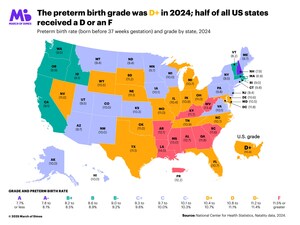
New March of Dimes Study Finds Lack of Maternity Care Associated with Higher Infant Mortality Across US
Analysis of more than 18 million births reveals infants born in counties with no maternity care access face a 14% higher risk of death.
ARLINGTON, Va., Nov. 11, 2025 /PRNewswire/ -- A new study published today in JAMA Network Open by researchers at March of Dimes finds that babies born in U.S. counties with little or no access to maternity care face a significantly higher risk of death during their first year of life.
The paper, "Maternity Care Access and Infant Mortality", analyzed more than 18 million live births from 2017 to 2021, revealing an association between lack of maternity care access and higher rates of infant mortality — an important measure of healthcare quality and broader societal well-being.
"These findings underscore a profound truth: where someone lives can determine their chance of survival in infancy," said Ripley Lucas, MPH, March of Dimes Data Analyst and lead author of the study. "Expanding access to maternity care is essential, but this research also makes clear that access alone isn't enough. We must also strengthen quality of care, community support, and conditions that shape health outcomes for moms and babies."
Researchers found that as access to maternity care decreased, infant mortality rates increased, rising from 5.2 deaths per 1,000 live births in counties with full access to 6.5 in those with none. After adjusting for known risk factors, like maternal education and chronic health conditions, infants born to women in counties with no maternity care access had a 14% higher risk of death compared to those in full-access areas.
Racial and ethnic disparities persist
When examining the results by maternal race and ethnicity, the study found that infants born to white women in no-access counties had a 20% higher risk of death compared to those in full-access areas. This pattern was not observed among other racial and ethnic groups, suggesting that systemic barriers prevent historically marginalized communities from fully benefiting from improved maternity care access.
Across all areas, Black infants experienced the highest infant mortality rates — more than twice that of White infants — even where full maternity care access existed.
Timing of infant deaths points to various causes
The study also found that infants in no-access counties faced an increased risk of death, 15% and 12%, in both the neonatal (less than 28 days old) and postneonatal (28 to 364 days old) periods, respectively. Causes of death vary between these time periods, indicating that multiple strategies are needed to address the issue, beginning with maternal healthcare that precedes pregnancy.
Postneonatal deaths, which are often influenced by caregiver support and environmental conditions, showed the largest disparities: 2.6 deaths per 1,000 live births in no-access counties versus 1.8 in full-access counties.
Need for better policies and practice
The research underscores the need for a comprehensive approach to reducing infant mortality that includes expanding maternity care access while investing in marginalized communities. Strategies such as workforce development, improved hospital quality, community-based programs, and stronger care networks are critical to reducing disparities and improving outcomes.
March of Dimes is working to improve maternal and infant health through programs like its Mom & Baby Mobile Health Centers®, which bring prenatal and postpartum care directly to communities with limited access to maternity services. The organization also advocates for policies that expand Medicaid postpartum coverage, increase access to doulas and midwives, strengthen telehealth in rural areas, and address the structural racism that drives disparities in maternal and infant outcomes.
The organization will release its annual Report Card next week, which measures the state of maternal and infant health in the U.S. by grading each state and the nation on preterm birth reporting on other measures, including infant mortality, highlighting disparities, and guiding policy and program efforts to ensure every mom and baby has a healthy start.
About March of Dimes
March of Dimes leads the fight for the health of all moms and babies. We support research, education, and advocacy, and provide programs and services so that every family can get the best possible start. Since 1938, we've built a successful legacy to support every pregnant person and every family. Visit marchofdimes.org or nacersano.org for more information. Follow us on social at @marchofdimes.
SOURCE March of Dimes Inc.








Share this article